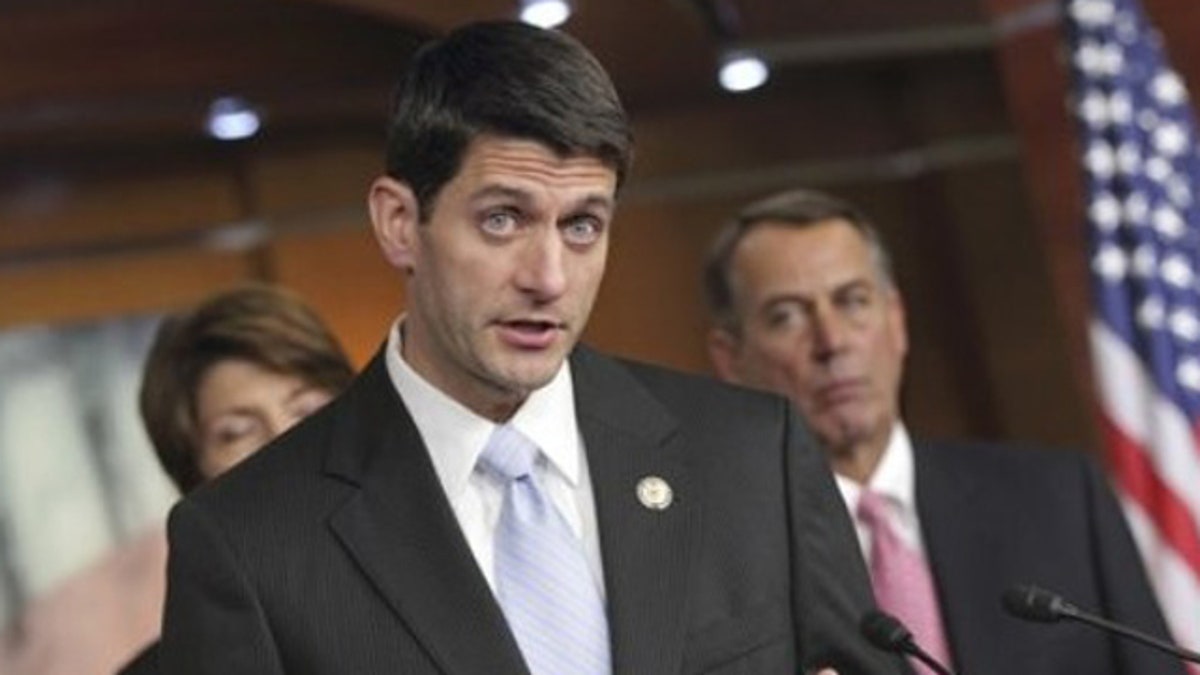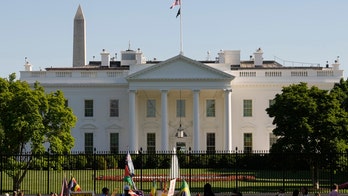
FILE 2011: Rep. Paul Ryan of Wisconsin, who is not a member of the supercommittee but as chairman of the House Budget Committee is a leading Republican voice on fiscal policy, said he believes something can get done by the supercommittee. (AP)
The 12-member deficit-cutting panel established last summer to come up with $1.2 trillion in savings over 10 years has until Thanksgiving to reach a proposal to maximize that goal, but observers are growing increasingly nervous about where compromise can be found.
The battle lines remain the same -- Democrats want to raise taxes and oppose cutting entitlements, while Republicans refuse to curb tax carve-outs without a guarantee of lower tax rates overall.
The impasse has lobbyists and aides in Washington -- traditionally stuck in gridlock -- increasingly skeptical.
But is it really impossible?
Set aside for the moment that additional pressures have already been put on the supercommittee to go big, and come up with something much greater than $1.2 trillion over 10 years.
And forget for a second that Washington is up to its eyeballs in investigating growing scandals like the loan to bankrupt solar power company Solyndra or Operation Fast and Furious.
Rep. Paul Ryan of Wisconsin, who is not a member of the supercommittee but as chairman of the House Budget Committee is a leading Republican voice on fiscal policy, said he believes something can get done by the supercommittee -- a deal on corporate tax reforms that would get reception from Republicans and the White House.
"I think that's the way to do it," Ryan told NBC's "Meet the Press." "I think they have the wherewithal to do that. And I do really believe that that will help us create jobs. We are taxing our businesses at much higher tax rates than our foreign competitors tax theirs and we're losing as a result of it."
The need to act is motivational.
"The automatic cuts that will go into effect in the event the supercommittee cannot reach a deal will severely damage the military, according to our military leadership and our civilian leadership," retired Lt. Gen. Benjamin Mixon told "values voters" at a summit in Washington over the weekend.
"Ladies and gentlemen, I don't believe we should be resting our national defense on deals and political gimmicks," Mixon said.
The incentive to act is evident to everyone in Washington. Without agreement, the cuts will be dramatic and painful to both sides. Hundreds of billions will be "sequestered" from some of the best-funded departments in the government, primarily the Pentagon budget and domestic entitlements like Medicare, food stamps and Medicaid.
The cuts wouldn't go into effect until the beginning of 2013, meaning Congress would have a second chance to take a stab at it in the lame-duck session following the elections next year.
But before an election as telling as 2012 is expected to be, no one can appear to be sitting idle.
Over the weekend, House Speaker John Boehner said he told his members of the supercommittee -- comprised of three Democrats and three Republicans each from the House and Senate -- that "there has to be an outcome."
"I don't underestimate how hard it's going to be to come to an agreement by the so-called supercommittee, but we have to get to one," Boehner told the values voters meeting in Washington.
For his part, Obama said he's offered a plan to reduce the deficit "in a more aggressive way than what the special committee's been charged with," but he's willing to talk with "folks" about corporate tax reform.
"I've already said I'm happy to engage with them on corporate tax reform. I'm happy to engage with them working to see what we can do to streamline and simplify our tax code, eliminate all the loopholes, eliminate these special interest carve-outs and potentially lower rates in the process while raising more revenue," the president told reporters on Thursday. "I am happy to negotiate with them on a whole host of issues."
But, the president added, the country is in an "emergency" now, and he can't wait for the panel's recommendations.
As a result, he has proposed the $454 billion American Jobs Act, a pint-sized portion of the $800 billion-plus stimulus plan that passed Congress in 2009.
The plan has faced considerable skepticism, not only from Republicans but members of his own party. The Senate is expected to vote on it this week, after Senate Democratic Leader Harry Reid added a sweetener to Democrats by agreeing to add an income tax hike of 5 percent on millionaires and billionaires.
House Minority Leader Nancy Pelosi on Sunday offered her support for the so-called "Buffett rule."
"When we said everyone should pay their fair share, the other side said that's class warfare.
No, it's not. It's the most endearing American value, fairness. And it's about everyone paying their fair share. We all have a responsibility to grow our economy, reduce the deficit, keep us number one," she told ABC's "This Week."
But in spite of persistent pleas, the jobs bill isn't going anywhere -- even if it does pass the Senate. And that puts the onus back on the supercommittee.
The agreement reached over the summer, which requires up-or-down House and Senate votes in December, was designed to ensure compromise. But so far, neither side is talking, which suggests either the deal can't be reached or no one is going to like it.
Asked last week whether she is confident that the panel can hit its $1.2 trillion goal, Sen. Patty Murray, a Washington state Democrat and co-chair of the panel, sidestepped the question.
"I am confident that the public is watching us very closely to see if we can show this country that this democracy can work," Murray told reporters. "I carry that weight on my shoulders every day and so does every member of this committee."
The supercommittee could steal from proposals already put on the table, including requiring federal workers to contribute more to their retirement, cuts to farm subsidies, auctioning the broadcast spectrum and curbs of payments to Medicare providers like skilled nursing facilities, rural hospitals and home health care services.
It wouldn't be enough to reach the goal, but it would be a starting point.
Ryan said other options already laid out in a dozen bills passed by the House this year include reducing regulations on small businesses that would allow them to grow, increasing the tax pool. Another idea, he said, would be to end talk of tax increases.
"Instead of job tax increases why don't we stop subsidizing wealthy people. Let's go after the crony capitalism and corporate welfare in the tax code, in spending, and why don't we income adjust our spending programs so we don't subsidize wealthy people as much. I think that's a better idea, you get more savings in the budget, get our debt down without doing economic damage," he said.




